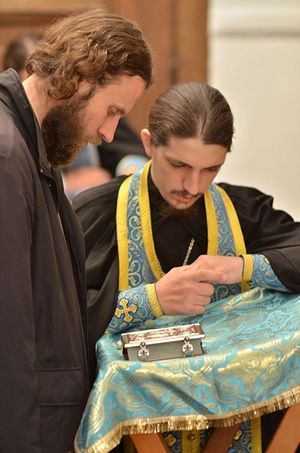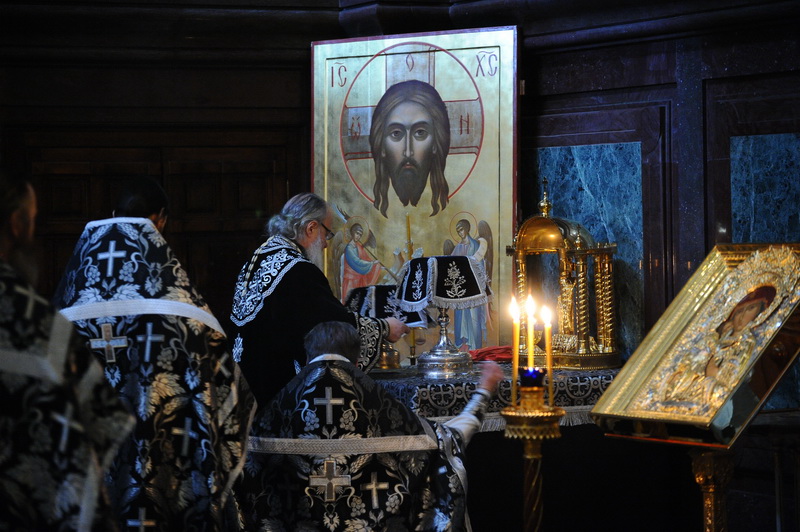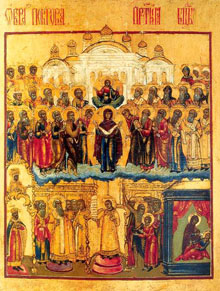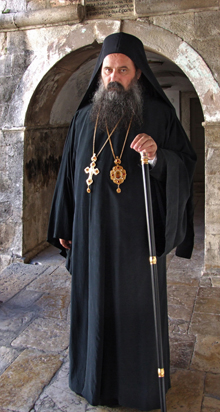Theology
Thursday in the first week of Great Lent
6. March 2014 - 10:39 Repentance is a sacrament by which those who confess
Repentance is a sacrament by which those who confess
their sins are invisibly absolved of them by Jesus Christ Himself,
at the priest’s visible expression of forgiveness.
Orthodox Catechesis
During the first week of Great Lent, all Orthodox Christians try to worthily prepare themselves for Communion of the Holy Mysteries of Christ. They first cleanse their souls in the sacrament of confession.
The Lord Jesus Christ said to His disciples, Verily I say unto you, Whatsoever ye shall bind on earth shall be bound in heaven: and whatsoever ye shall loose on earth shall be loosed in heaven (Mt. 18:18). And in another place, He breathed on them, and saith unto them, Receive ye the Holy Ghost: Whose soever sins ye remit, they are remitted unto them; and whose soever sins ye retain, they are retained (Jn. 20:21-23). Fulfilling the Lord’s will, the apostles in turn gave this authority to their successors—the pastors of Christ’s Church, and to this day, all the right-believing Christians who sincerely confess their sins before an Orthodox priest can receive through him the prayer of absolution, forgiveness, and complete remission of sins.
Wednesday of the first week of Great Lent
5. March 2014 - 11:02 On Wednesdays and Fridays (and on certain feast days) throughout the entire period of Great Lent, the Liturgy of the Presanctified Gifts is celebrated.
On Wednesdays and Fridays (and on certain feast days) throughout the entire period of Great Lent, the Liturgy of the Presanctified Gifts is celebrated.
On the first week of Great Lent, according to tradition, most Orthodox Christians approach the Holy Mysteries of Christ after an especially concentrated preparation for confession and Communion, usually on Saturday or Sunday. Communing at the Liturgy of the Presanctified Gifts during the first week of Great Lent are those who due to illness or some other reasonable cause are not able to fast strictly during the five days of this especially important Lenten week. During the other weeks of Lent, anyone who wishes may receive Communion at the Liturgy of the Presanctified Gifts; this does not include infants, who may be communed only at the full Liturgy.
The Beginning of the Great Lent
3. March 2014 - 10:52 The doors of repentance are opening, Great Lent is beginning. Every year Great Lent is repeated, and each time it brings us great benefit if we spend it as we should. It is a preparation for the life to come and, more immediately, a preparation for the Bright Resurrection.
The doors of repentance are opening, Great Lent is beginning. Every year Great Lent is repeated, and each time it brings us great benefit if we spend it as we should. It is a preparation for the life to come and, more immediately, a preparation for the Bright Resurrection.
Just as a stairway is built into a tall building in order to enable one, by climbing the steps, to easily reach the top, so too, the various days in the year serve as steps for our spiritual ascent.
This is especially true of the days of Great Lent and Holy Pascha.
By means of Great Lent we cleanse ourselves of the filth of sin, and at Holy Pascha we experience the blessedness of Christ's Kingdom that is to come. In climbing a high mountain, one tries to eliminate all unnecessary weight. The less a person carries, the easier it is for him to climb and the higher he is able to climb. So, too, in order to ascend spiritually, it is necessary first of all to free oneself from the weight of sin. This weight is lifted from us through repentance, provided that we banish from ourselves all enmity and forgive each person whom we consider to be at fault before us. Once cleansed and forgiven by God, we then greet the Bright Resurrection of Christ.
Homily on the feast of the Protection of the Mother of God
17. October 2013 - 13:50 For those who celebrate the commemoration of the miraculous appearance of the Protecting Veil of the Mother of God, nothing could be more joyous than if we announced that this grace-filled Protection is spread even over us. But who could be the bearer of these glad tidings? Whose eye is capable of seeing the Most Holy Intercessor, “in the air, praying to Christ for us?” There are no obvious mystical seers like blessed Andrew and Epiphanius among us; and the hidden mysteries known only to the Lord will remain hidden unto the ages.
For those who celebrate the commemoration of the miraculous appearance of the Protecting Veil of the Mother of God, nothing could be more joyous than if we announced that this grace-filled Protection is spread even over us. But who could be the bearer of these glad tidings? Whose eye is capable of seeing the Most Holy Intercessor, “in the air, praying to Christ for us?” There are no obvious mystical seers like blessed Andrew and Epiphanius among us; and the hidden mysteries known only to the Lord will remain hidden unto the ages.
Nevertheless, we also, standing now in church, are not without a witness. In fact, it is the most reliable testimony that the Protection of the Most Blessed Virgin is spread also over us. Who is this witness? Not an earthly person, not even an angel, but our Protectress herself! With boldness and surety I say this on Her behalf; for isn’t Her holy and miracle working icon, which we see in this church, the constant, visible pledge of Her invisible protection?... We know from the history of miracle-working icons that in times of heaven’s wrath against human sins, these icons suddenly hid themselves and appeared in other places, or disappeared entirely. Therefore, as long as our Protectress does not abandon her place here, as long as she does not deprive her image of the grace-filled power of working miracles, as long as she receives our prayers and grants us timely help—we can, despite all our impurity, maintain a steadfast assurance that we are under her grace-filled Protection.
Bishop Fotije of Dalmatia: Homily on the Feast of the Elevation of the Holy Cross
28. September 2013 - 14:38 May today's Feast be joyous and this day be blessed of the Elevation of the Holy Cross, which is called among the people Holy Cross Day. We have gathered today in our holy monastery at the Divine Liturgy, to pray to God and that through Holy Communion we demonstrate that we are the Body of Christ, that we do not belong only on earth. We have shown today that we are a part of the mystical Body of Christ precisely through Holy Communion, but also through our entire podvig, our prayer and efforts. The crown of our life is today's approaching the Holy Chalice.
May today's Feast be joyous and this day be blessed of the Elevation of the Holy Cross, which is called among the people Holy Cross Day. We have gathered today in our holy monastery at the Divine Liturgy, to pray to God and that through Holy Communion we demonstrate that we are the Body of Christ, that we do not belong only on earth. We have shown today that we are a part of the mystical Body of Christ precisely through Holy Communion, but also through our entire podvig, our prayer and efforts. The crown of our life is today's approaching the Holy Chalice.
With Communion we show that we cannot live alone or only for ourselves, but we live with Christ, for Christ and in Christ. All of that is confirmed at the Divine Liturgy when the priest says: "With the fear of God, in faith and love, draw near!", we humbly approach to commune of the Life-giving Rib of Christ. That's why, brothers and sisters, we come together in Church for the great Feasts, for every Liturgy is the Resurrection; at every Liturgy we celebrate the Resurrection of Christ as the central Feast of the Church.


